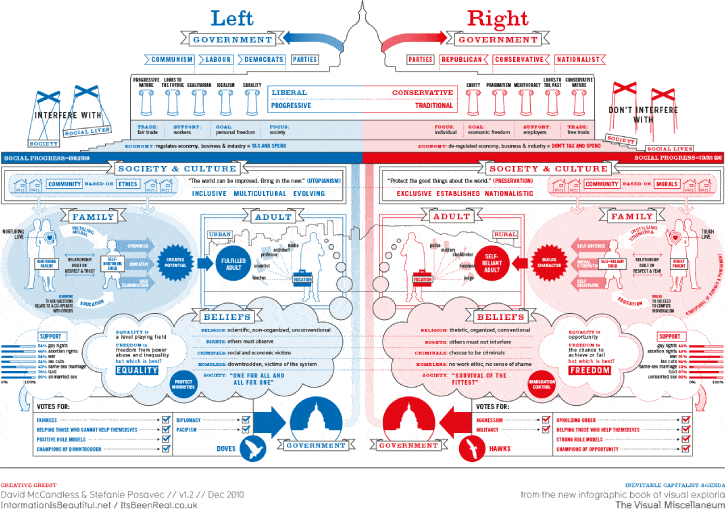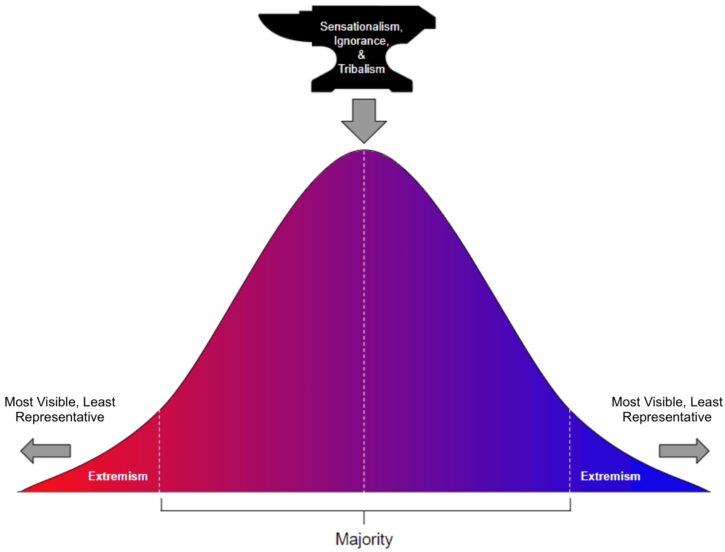At the end of the day, there are two political camps in the my country – those who hope and those who fear. The hopeful are usually labeled “liberals” or “progressives,” while the fearful are labeled “conservatives” or “traditionalists.” We all fall between these two extremes on virtually every conceivable issue.

Fear helps us survive. Hope also helps us survive. They’re simply different approaches to the same end: Fear evolved to keep us away from things that threaten our survival. Hope evolved to seek out opportunities to survive better. Fear keeps us away from the negatives, while hope motivates us to seek out the positives. Fear is repulsive, hope is attractive, and so on.
Hope and fear are in constant struggle within us. For example, I hope to win the lottery, but given my understanding of probability, do I fear losing the money required to buy a ticket? A purely hopeful person will buy tickets until they have no money left. A purely fearful person will never buy a ticket at all. It’s a question of where your biology and upbringing places you along that spectrum. The majority of us think the payoff for winning is huge, but the tickets are so cheap it won’t matter if we lose. So we end up buying the ticket! This is intentional psychological engineering implemented by the folks who run the lottery organizations (casinos also assess hope and fear in this manner).
People react differently to things like lottery tickets because they’re so diverse, both in biology and upbringing.
We’ll take a brief look at biology first…
The Physiology of Fear
The part of the brain responsible for fear is primarily the amygdala. In fact, as of this writing there is a female patient still living who is known by the medical community as “patient S.M.” This patient has an extremely rare genetic disease that resulted in the total destruction of her amygdala. The woman is known to be completely without fear; handling snakes and spiders freely, walking up to strangers without any inhibition, and a total inability to recognize social fear cues in others. This patient (among mountains of other evidence) clearly links our experience of fear to a physical component of the brain – the amygdala, which is also responsible for things like our fight or flight response and represents our “reptilian brain,” which is the most ancient part of our brain evolutionary-speaking.
The Physiology of Hope
Hope is different. Hope is a more sophisticated emotion in the sense that it evolved more recently on biological timescales and engages more areas of the brain. Of particular note is the prefrontal cortex, which is responsible for things like one’s will to live and thoughts about the future. The prefrontal cortex (along with the cerebral cortex generally), is also a major player in higher reasoning and logic, which are required to feel hope about something.
No healthy person is purely hopeful or purely fearful biologically. We exist as grey analogs between the two extremes, engaging all areas of the brain mentioned. It’s simply a question of degree. Some are more influenced by one area of the brain, where others are more influenced by another.
Nature vs. Nurture
Although our biology demonstrably affects our behavior, one’s upbringing clearly also plays a role. For example, being raised in a conservative family will have a different effect on cognitive development than being raised in a liberal family, all else equal. Although children certainly rebel, on average most end up inheriting many of the values of their parents – “the apple doesn’t fall far from the tree.”
In total, we are simply the sum of these biological and environmental factors. No more, no less.
Now let’s take a look at how this ties into politics…
All (successful) political theory can be reduced to a straightforward psychological engineering formula: Assess the probabilities surrounding which demographics will vote for which social platforms, then optimize your message and image to maximize the number of votes you’ll get. It’s a game, really. And this game is the only thing that truly matters to a politician. Unless they wish to commit political suicide, politicians will always adapt themselves to the maximum number of votes. This is why idealists and true believers in social progress (“good people”) will ultimately fail in modern politics regardless of the purity of their intentions if they don’t understand “the game.”
In fact, politicians have become surgical in their ability to manipulate themselves to gain votes (i.e. they are professional liars). It’s hard to blame them for this however, as it’s a literal job requirement. One simply cannot gain enough traction in the modern political system without lying, which is why the only appropriate way to judge a politician is to view their voting record.
So, how does this political gaming ultimately affect our fear and hope-driven society? In a word: polarization.
In a financial and political symbiosis with the modern media, politicians fan the flames of our innate tribalism to gain and maintain power. Incidental to this “us against them” propaganda, our society has seemingly become more distrustful, more polarized, and less willing to compromise than it has ever been. At least, until you look more closely…
Let’s consider two voters – Jack and Jane.

Liberal Jane feels conservatives are primitive, gullible, hawkish, stubborn, ignorant, and generally holding this country back from progress. Jane supports things like environmentalism, social equality, tolerance, sexual openness, and political reform. Jane is a scientist living in the city who feels we can do better when she walks by the homeless. She views their misfortune as the result of an unfair economic system and feels the world has much room for improvement.

On the other hand, conservative Jack feels liberals are egotistical, naive, dovish, wear rose-colored glasses, and are generally advocates of upsetting systems that are in place for a reason. Jack supports things like the free market, military spending, self-discipline, self-determination, traditional moral values, and maintaining the status quo. Jack is a business owner living in a rural area and thinks of the homeless as people lacking a strong work ethic. He feels we live in an economic system that affords sufficiently equal opportunities that anyone can elevate themselves if they put in the required amount of work.

Jack and Jane are no doubt familiar to you. Indeed, the media actively espouses them as stereotypically representative of the American citizenry. However, a mere question unveils how ridiculous that notion is: Do I believe everything Jane believes or everything Jack believes? Of course not! I am a unique individual and perceive strengths and weaknesses within both philosophies.
The reality is Jack and Jane are extremists, where most of the American population are not. In fact, simply by the mathematical nature of an “extreme,” the majority is necessarily not so.
In Jack and Jane we find fear and hope personified, with their entire philosophy stemming from those basic emotions. But we the people are not at all like Jack and Jane – the vast majority of us are a complex melting pot of different emotions and experiences that make us unique. But politicians can’t reliably win if they tailor their approach to the individual. Instead, they must strategically categorize.
Consider the following…
The Island
Say you take a random group of humans and have them create a political system to govern themselves while stranded on an island. Inevitably, due to subtle differences in biology, some will be more inclined to feel fear or hope. This will result in different preferences and rationalizations when topics come up for consideration.
For example, Martha may feel more adventurous and urge her peers to spend more time and resources on boats to escape the island. On the other hand, Gary may feel it’s wisest to stockpile the resources they have and wait for rescue. At first, people will see the logic of both arguments. But as time passes, the pressure to make a decision will increase, while Martha and Gary take increasing measures to ensure their ideologies are the ones ultimately acted upon. As things escalate, a certain tribalism forms where “we’re all in this together” becomes “we’re right and they’re wrong” or “us against them.”
All political systems do this.
Polarization is as natural to human culture as breathing because it appeals to our biases. We naturally (and irrationally) favor ideas not because they are logically superior, but because we feel better about them in some way. This naturally leads us to covet our own and dismiss contradictions – a.k.a. “tribalism.”
In the modern world (very much catalyzed by gossip and the rapidity of modern media), fear and hope have polarized greatly. So much so that the weight of our increasing tribalism, sensationalism, and ignorance has compressed the political bell curve, pushing moderates into extremity. I call this phenomenon “political pancaking.”
Pancaking The Political Bell Curve

Because an increasing number of voters are being influenced or even pressured towards extremity, increasingly extremist politicians begin to gain footholds where they never would have previously.
History is littered with countless examples of this phenomenon – the Nazis, the Roman Empire, France, Spain, England, etc. The real question is what to do about this pancaking effect. Extremism clearly does not work. Whether it’s theological, political, philosophical, whatever, extremism is always a naive oversimplification of reality.
So what to do about it?
I have no delusions about the difficulty of this (very old) problem, but as usual I’m going to attack it anyway. I have two ideas…
1) Find ways to reasonably regulate the media without putting free speech in jeopardy
I wrote about this here.
2) Fix our broken educational system
I intend to write far more on this subject, but generally I believe the following changes to contemporary educational institutions will result in a much healthier society:
- Remove Forced Non-Secular Influence: Religious or spiritual influence is fine, as long as it is not part of any formal curriculum (or routine) and exists purely as an optional outside extracurricular activity
- Teach Skepticism: Questioning authority, fact-checking, learning to provide sources for official works (and expecting it in others), understanding the importance of peer-review, and possessing general epistemic responsibility are all part of a healthy skeptical mind
- Teach Critical Thought: Contemporary curriculums focus far too much on memory. The world is not served by the cultivation of parrots – children need to be taught how to think for themselves and should be challenged to figure things out as much as possible
- Teach Introspection: There are far too many lies out there that imply the human mind is strong. It’s not. It’s riddled with cognitive bias. Real strength comes from recognizing this weakness, combining minds, and implementing logical disciplines (like the scientific method)
- Teach Emotional Intelligence: Too many institutions focus on logic, barely devoting any attention to the most fundamental part of the human experience – emotion. Our culture denies it, educational systems ignore it, but in the real world emotional intelligence is far more valuable than logical intelligence. You will get much farther in life with a high “EQ” than a high “IQ”
- Teach Moderation: Immaturity involves seeing the world as binary categoricals – black or white, good or evil, pure or impure, etc. But the world isn’t binary. It’s convoluted, unpredictable, grey, and complex. Younger generations need to be taught this earlier – perfection is a lie, black and white is unrealistic, etc. Habitually looking for the grey, the nuances, of any issue makes one a far more dangerous contender
I can only imagine what would happen if the above was implemented with genuine vigor. The US is already experiencing severe “pancaking,” which I’d argue is one of the heralds of every great empire’s collapse.
Fortunately, it’s different this time: New technologies, freedom of ideas and expression, transparency, and connectedness have very much changed the landscape. But will it be enough?
I prefer to see the situation as uncertain, but hopeful.